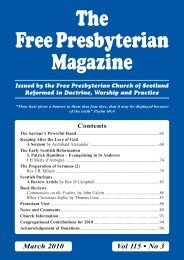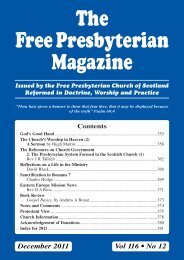April - the Free Presbyterian church of Scotland
April - the Free Presbyterian church of Scotland
April - the Free Presbyterian church of Scotland
Create successful ePaper yourself
Turn your PDF publications into a flip-book with our unique Google optimized e-Paper software.
Scottish Reformers’ View <strong>of</strong> Romanism 117could display her vices openly. Ambitious people <strong>of</strong>ten went into <strong>the</strong> Churchbecause this was where power and money were to be obtained. The leadingBishop, <strong>the</strong> Archbishop <strong>of</strong> St Andrews, was one <strong>of</strong> <strong>the</strong> richest and mostpowerful men in <strong>the</strong> country. Rome felt herself to be in no danger from a fewdisgruntled merchants and lairds because so many powerful people had aninterest in supporting her. In Aberdeen, for instance, <strong>the</strong> Bishop from 1547was William Gordon, uncle <strong>of</strong> <strong>the</strong> fourth Earl <strong>of</strong> Huntly, who was one <strong>of</strong> <strong>the</strong>leading noblemen in <strong>the</strong> country. Huntly had secured <strong>the</strong> position for him,and in turn <strong>the</strong> Bishop installed his nephew as hereditary Baillie <strong>of</strong> <strong>the</strong>Diocese. A few years later, Huntly’s illegitimate bro<strong>the</strong>r Alexander became<strong>the</strong> Bishop <strong>of</strong> Galloway. With strength like this, Rome could be herself andthis was what <strong>the</strong> Reformers saw. Since <strong>the</strong> Reformation we have alwaysseen <strong>the</strong> Church <strong>of</strong> Rome in disguise in <strong>Scotland</strong>.(2.) For <strong>the</strong> Reformers, Rome was <strong>the</strong> great enemy <strong>of</strong> true religion. TheChurch <strong>of</strong> Rome had a prominence in <strong>the</strong>ir thinking which she has not hadsince. Anyone considering <strong>the</strong> state <strong>of</strong> <strong>Scotland</strong> could see, first and foremost,<strong>the</strong> corruptions <strong>of</strong> <strong>the</strong> Church. The false doctrines <strong>of</strong> Rome were everywhere– in <strong>the</strong> mass and in idols. Anyone who attempted anything in <strong>the</strong> way <strong>of</strong>reformation soon found that Rome was <strong>the</strong> main obstacle to propagating <strong>the</strong>truth. Rome had <strong>the</strong> sort <strong>of</strong> power that communism has in China. When peoplecriticise Knox’s denunciations <strong>of</strong> Romanism, <strong>the</strong>y generally do not understand<strong>the</strong> nature <strong>of</strong> <strong>the</strong> struggle in which he was engaged. It was a life-and-deathstruggle against a system that was quite prepared to burn men and to sentence<strong>the</strong>m to <strong>the</strong> galleys. It was not some academic debate but a war to <strong>the</strong> death,and <strong>the</strong>refore strong language was appropriate. Nowadays <strong>the</strong>re are manyo<strong>the</strong>r spiritual enemies, and Rome is not as immediately threatening in<strong>Scotland</strong> as it was. But it was o<strong>the</strong>rwise in <strong>the</strong> days <strong>of</strong> <strong>the</strong> Reformation.(3.) Their view <strong>of</strong> Rome depended on <strong>the</strong> light that <strong>the</strong>y had. Generally,with Reformers such as Wycliffe and Lu<strong>the</strong>r, <strong>the</strong>re was first <strong>of</strong> all an attemptto reform – to draw attention to matters where reformation was needed – and<strong>the</strong>n, when this met with rebuff and persecution, a realisation that reformwas impossible and that <strong>the</strong> only thing to do was to separate from <strong>the</strong> Church<strong>of</strong> Rome. Some people were quick to realise this, and some ra<strong>the</strong>r slow. Theissue <strong>of</strong> separation from Rome is connected with <strong>the</strong> doctrine <strong>of</strong> <strong>the</strong> Church:what ought <strong>the</strong> Church to be like, and when is <strong>the</strong> time to separate from acorrupt Church? This is an important and continually relevant question. In<strong>the</strong> twenty-first century, we are used to tiny denominations and <strong>the</strong> freedomto separate, but formal separation from <strong>the</strong> Church <strong>of</strong> Rome was a novel anddangerous matter before <strong>the</strong> Reformation.What is one’s duty when one realises that one is in a corrupt Church; and
















